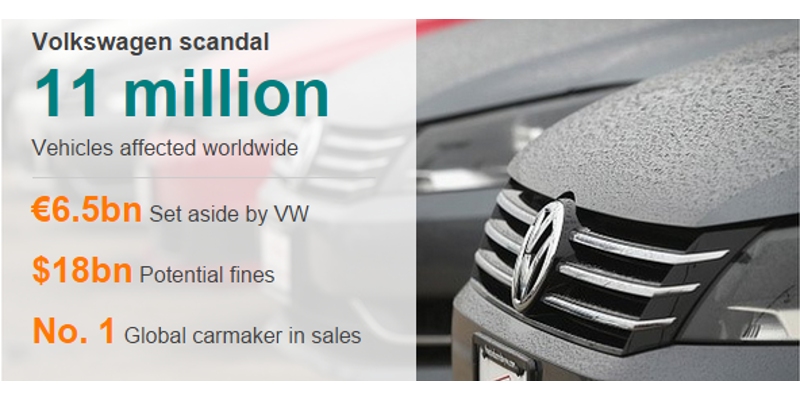
The scale of Volkswagen’s emission test cheating
As reported by the BBC, Volkswagen is the number one global car maker in terms of sales. However, with Volkswagen admitting it deceived regulators in exhaust emissions tests by installing a device to give more positive results, they are now looking at huge financial penalties and possible legal action. The sheer scale of the issue is already impacting the Group’s share price and will undoubtedly affect new and used car sales.
Volkswagen brand loyalty- will customers stay loyal?
Beyond the fines, which could be substantial, the biggest issue to Volkswagen is damage to brand reputation. Prior to this issue UK Volkswagen, as a group, were ranked in the top 3 of our Automotive Brand Loyalty Index, however we suspect that their ranking is likely to fall considerably as a result.
Within their customer base we identified an average proportion of “Conditioned Switchers”, which is one of the consumer loyalty segments. Typically Conditioned Switchers are more likely to actively seek out information about competitor brands, they tend to be bigger users of social media, and exhibit the highest propensity to switch brands. The question for Volkswagen is therefore how many of these Conditioned Switchers are now more likely to switch at the next opportunity? Possibly of equal concern will be the proportion of the traditionally more loyal customer groups, such as the “Lazy Loyalists”, “Loyalists” or “Neutrals”, who may now defect.
Overall we found that one in four consumers stated that brand image was very important to them. With resale values a fundamental component of purchase decision making, Volkswagen is going to have a big task in rebuilding consumer confidence.
How does this effect consumer Automotive Loyalty generally?
Our research found automotive loyalty is closely linked to reliability, dealer experience and satisfaction with the warranty, all of which Volkswagen has traditionally been very good at. But, with brand image also being one of the top four drivers, PR management will now become increasingly important for Volkswagen to rebuild trust. The lesson for other brands, and the opportunity they have, will be to ensure their own trust is not affected by this scandal and to capitalise on the key automotive loyalty drivers in order to appeal to consumers most likely to switch; social media will particularly play an important role in influencing Conditioned Switchers.
We have seen in our ‘Loyal Losers’ research into other sectors, such as utilities and insurance, that trust plays a big part in loyalty; however some consumers are more affected by the perception of trust than others. For automotive manufacturers generally the biggest issue now will be to ensure their own reputation is seen as trustworthy.
What Volkswagen could do to try and retain customer loyalty?
One action Volkswagen, and all automotive manufacturers, can do will be to monitor consumer loyalty segments amongst their customer base to benchmark the profile of their customer base against national representation of these groups to give a clearer projection of their relative customer loyalty against other brands, which in turn will have help predict future repeat sales or potential brand defection.
Consumers talk about their automotive loyalty – 2015
Part of our research involved interviews with new car buyers about their attitudes to automotive loyalty. The following short video (5 minutes) shows some typical attitudes and opinions expressed about automotive loyalty: Automotive loyalty video – the consumer view